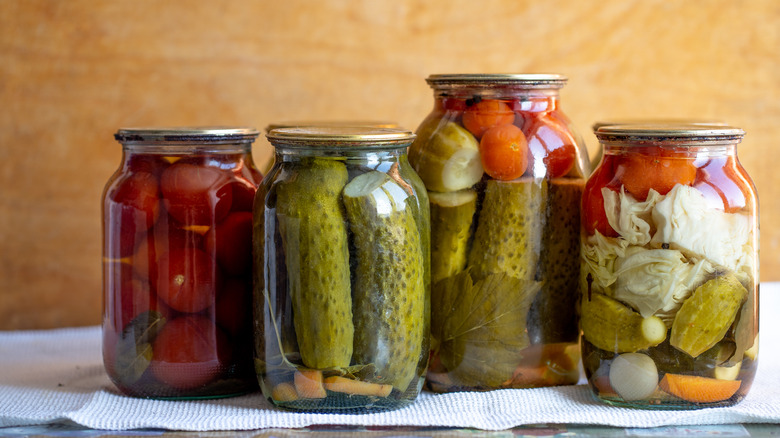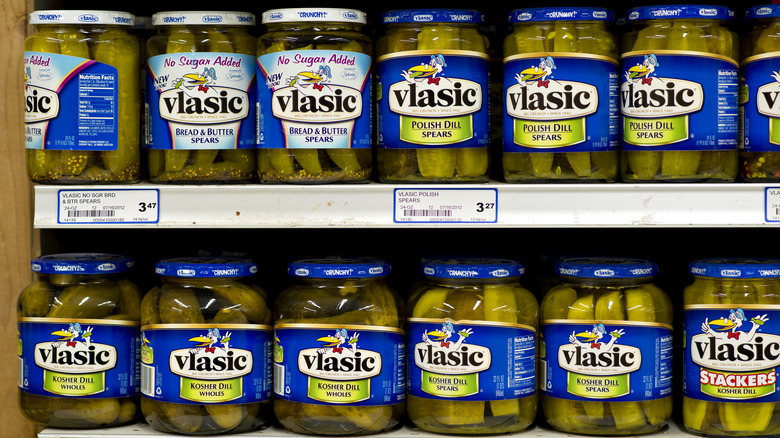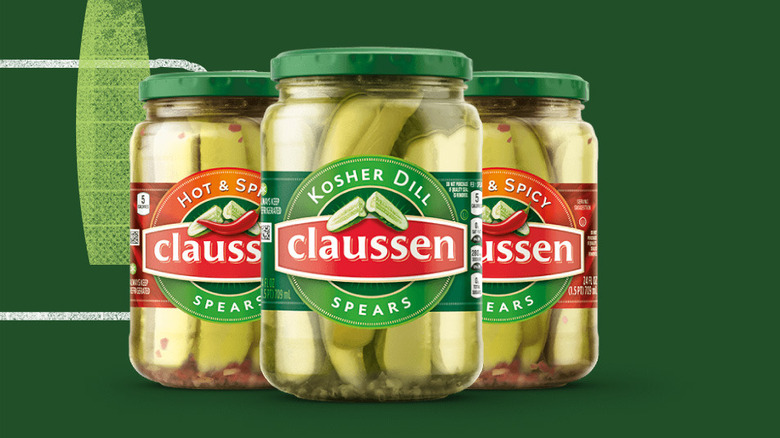Your Favorite Brand Of Pickles Might Not Be The Real Dill
If you had "pickle conspiracy" on your 2023 bingo card, then congratulations. TikTok has come through with the goods as users have posted a series of inquiries about the legitimacy of a number of prominent brands, after one person posted a video in which he pointed out that several beloved American pickle manufacturers don't even use the word "pickle" on their packaging at all. Jesse Banwell, the TikToker at the heart of it all, may have never intended to stir up quite a hubbub, but social media users and food writers alike are now puzzled over this strange coincidence.
@jessebanwell
The brands mentioned, Claussen, Mt. Olive, and Vlasic, all seemingly omit the word "pickle" from their jars. It doesn't appear on the label, the lid, or the ingredient list, though the word is used on their websites and social media accounts. For example, Claussen's Instagram handle is @claussenpicklesofficial while its website uses the tagline, "The original refrigerated pickle"; and Mt. Olive's is @mtolivepickles. There are several theories as to why this is the case, but the biggest one suggests that their goods might not technically be considered pickles at all, at least according to the U.S. government.
Some of the brands may be trying to avoid a legal pickle
The United States Department of Agriculture, which oversees much of our national food regulation, has official documentation defining U.S. Standards for Grades of Pickles. These standards define one as being made "entirely or predominantly from cucumbers," and fermented or preserved using "clean, sound ingredients" to a pH of 4.6 or below.
These standards are not exact, and leave a lot of room for versatility in terms of production requirements when it comes to basic pickling. But, many on TikTok have insinuated that the brands that leave "pickle" off their labels have been doing so because their products don't actually meet the legal requirements to be branded as such.
The problem is that it is difficult to certify whether or not this is true. The only aspect of these regulations that could be easily tested is the acidity of the product, and when independently tested by interested pickle conspirators, all of the major brands in question tested within the required pH. Yet, others have suggested that these brands don't meet the FDA SOIs, or Standards of Identity for Food, and as such cannot be called pickles. But, as with the USDA regulations, there don't appear to be any discrepancies between what the FDA considers a pickle and what these brands are selling.
What are the pickle brands saying?
When asked to explain their labeling choices, the pickle brands in question have offered rather confusing reasons for referring to their goods instead as spears, chips, or other shape-based words. Essentially, they have claimed that calling them pickles is simply unnecessary, because consumers know what pickles are, and there's no point in wasting label space that could be used to identify more specific details about the flavor or style. After all, isn't the term grilled sweet & spicy spears more evocative than plain old "pickles"?
The FDA doesn't require brands to call foods by their names on labels, either, if it's evident what the food is (for example, if you can see the food through a clear jar or packaging). So the brands aren't breaking any rules by not labeling their jars as pickles. But the whole thing still comes off as somewhat suspicious. We may never know the real deal, but at the end of the day, if it looks like a pickle, smells like a pickle, and tastes like a pickle, it's probably just a pickle.



